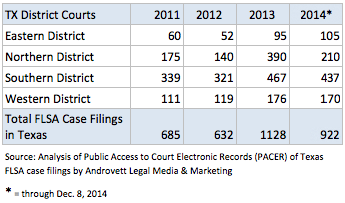© 2014 The Texas Lawbook.
By Kerry Curry – FORT WORTH – (December 11) – For years, Native Oilfield Services required truck drivers to be at work early in the morning to haul sand to fracking sites in the Eagle Ford and Permian Basin.
Many times, no trucks were immediately available, causing the drivers to wait – sometimes for hours – for trucks to arrive. The Fort Worth-based company told drivers they would not be paid for the waiting period.
In August, a federal jury in Dallas ruled Native Oilfield Services willfully violated the Fair Labor Standards Act when it refused to pay 108 truckers millions of dollars in overtime.
Texas workers sued 922 times so far this year, up from 632 lawsuits in 2012 and 280 cases in 2004, according to research by Androvett Legal Media of U.S. District Court cases filed in the state’s four regions. Last year, 2013, saw the most cases ever filed in Texas: 1,128.
Native Oilfield is one of hundreds of Texas businesses facing – and most likely losing – lawsuits brought by workers claiming that employers cheated them from proper compensation.
Wage-and-hour lawsuits filed in Texas by workers and federal regulators have increased 41 percent during the past three years and more than tripled over the past decade. Many of those complaints are finding a sympathetic federal court system and resulting in Texas companies forking over tens of millions of dollars in back wages and legal fees.
“The number of calls I get from potential clients with viable wage-and-hour cases are more than I have the time and resources to accept,” said Baron & Budd employment lawyer Allen Vaught, who is representing the truck drivers against Native Oilfield.

Texas workers sued 893 times so far this year, up from 632 lawsuits in 2012 and 280 cases in 2004, according to research by Androvett Legal Media of U.S. District Court cases filed in the state’s four regions. Last year, 2013, saw the most cases ever filed in Texas: 1,128.
The Androvett data study found that the federal courts in the Northern District of Texas, which includes Dallas and Fort Worth, witnessed a 49 percent increase in new wage-and-hour complaints being filed since 2012.
The Southern District of Texas, which includes Houston, has by far the most wage-and-hour litigation. So far this year, 467 such cases have been filed – a 31 percent increase over 2012.
The biggest jump came in the Eastern District, which includes Plano, Texarkana and Tyler, where 83 percent more Fair Labor Standards Act lawsuits have been filed at this point in 2014 compared to 2012, according to Androvett.

“I keep expecting the tidal wave of FLSA suits to subside, but it doesn’t look like it is going to happen anytime soon,” said Ogletree Deakins shareholder Ron Chapman, who represents businesses in labor and employment disputes.
In addition, the U.S. Department of Labor this year opened two new Texas offices – Austin and Temple – to handle the increased complaints the agency is receiving. The regulator is considering opening an additional branch in Midland, according to lawyers.
Legal experts say the spike in new wage-and-hour cases filed is the result of several interlocking factors: strong growth among small and medium-sized businesses unfamiliar with technicalities of wage-and-hour laws, increased knowledge of the laws by workers through social media, aggressive techniques by trial lawyers and a federal law written favorably for workers.
“For plaintiffs, it’s the best federal law on the books because you start with the presumption that you win,” said Charles “Trey” Branham III, partner at Dallas-based Branham Law, who has represented workers in wage-and-hour cases since 2008.

The Fair Labor Standards Act was passed in 1938 in the wake of the Great Depression to protect American workers. It immortalized the American ideal of the right to a fair day’s pay for a fair day’s work.
The law created the 40-hour workweek, restricted child labor and established a minimum wage, overtime pay and recordkeeping for the private and public employment sectors. The Department of Labor’s Wage and Hour Division enforces the act.
Trial lawyers only recently started focusing on the 76-year-old federal statute when they realized that it guaranteed legal fees if the plaintiff prevails. In many cases, the company sued for the violation is ordered to pay only a few thousand dollars for the actual hour-and-wage violations but may be forced to pay out far more than that in legal fees.
“From 2009 up to the present, you’ve had more firms advertising for these cases both through traditional media like TV and radio and on the Internet,” said Derek Braziel, a partner at Dallas’ Lee & Braziel, which started handling wage-and-hour cases in 2002.
“You have people, as a result of that, becoming more aware of their rights so they are seeking out lawyers,” he said.
No lawyer has taken advantage of FLSA more than Austin attorney Charles Scalise with the Ross Law Group.

Scalise recently represented a Dallas plumber whose boss required him to be at work at 7:30 a.m. but refused to start paying him until 8 a.m. The jury awarded the plaintiff $32,265, which included liquidated damages. Even more damaging to the company is that Scalise is seeking $50,000 in attorney’s fees.
“I’m always surprised when these cases don’t settle,” he said. “Many times the fact that there has been a violation is pretty clear. If I’m an employer, and I know I’ve violated the law, it makes sense to get the case settled.
“Large corporations are looking at their pay policies more closely,” Scalise said. “They’ve had to deal with these collective claims for several years now and have definitely started looking at this area much closer than they ever have before.”
While FLSA cases against small and mid-sized oil and gas companies attract a lot of attention, these lawsuits are actually most common in the restaurant and hospitality industries where tipping practices and other payment rules can result in wage-and-hour disputes.
“A lot of restaurants are mom-and-pop,” said Ann Marie Painter, a partner at Perkins Coie in Dallas who specializes in employment law. “It is not difficult to find restaurants where they are not aware of the technical requirements of the law.”

While Painter declined to discuss the case, court records show that the restaurants’ waiters, bartenders and busboys sued in August alleging they were not paid for all hours worked, were not paid the proper overtime rate, were forced to work through breaks and were not properly compensated for after-shift work.
The lawsuit also alleges the company penalized workers when customers left without paying (aka “dine and dash”), when dishes were broken and when the cash register came up short at the end of the night. The workers also claim that the company improperly gave portions of tips from customers to management.
Legal experts say that a significant portion of the wage-and-hour cases being filed are simply because business owners and managers don’t understand the guidelines.
Houston labor and employment lawyer Jessica Glatzer Mason points to many businesses that have policies requiring employees to get pre-approval before they work overtime.

Mason recommends that employers in that situation pay for the overtime but treat it as a disciplinary issue.
“If an employee is not getting their work done during the work day, you have to look at why,” she said. “Are you giving them too much work to do? Then you have to accept the overtime or look at your staffing. If the person should have more than enough time to get their work done but they are not, if they are goofing off … that is a disciplinary issue.”
While most wage-and-hour disputes tend to be black-and-white, lawyers representing companies say that attorneys for workers have started getting more aggressive in pursuing more FLSA cases that are not the cut-and-dried.
“We are seeing more of the ‘you didn’t properly pay me for driving time’ or ‘you didn’t pay me for the time it takes me to get into my uniform or to shower after the chemical part of my work is done,’” Mason said. “Employers who are trying in good faith to comply with the law don’t always know the right answer.”
In fact, the Supreme Court of the United States weighed in just this week about lawyers getting too expansive in trying to enforce FLSA. In a 9-0 opinion, the justices on Dec. 9 rejected claims by former Amazon warehouse workers that the Internet retail company should have compensated them for time spent in security screenings as they exit the workplace. Here is a link to the article: http://www.supremecourt.gov/opinions/14pdf/13-433_5h26.pdf
The Supreme Court cited the Portal-To-Portal Act, which amended the FLSA in 1947 to exempt employers from liability for “preliminary or postliminary” activities and said the workers’ contention that Amazon contractor Integrity Staffing Solutions could have shortened the wait times with more screeners or staggered shift terminations was more appropriate for the bargaining table.
Business lawyers say there are basic steps employers can take to protect themselves against expensive litigation.
“Some employers look for ways to further document with their employees that time has been recorded appropriately and get an affirmation from the employee that they’ve been paid for all time worked,” Painter said. “They may find a way to get a written affirmation from the employee that they’ve reviewed their time, that it is accurate and that they’ve been paid for everything. You see employers putting in more touch points where the employee is forced to look at the pay and confirm that it is right.”
The law, however, can get complicated when employers are using anything other than the traditional workweek. Piece work, flat rates and fluctuating workweek rules can be complicated and it can become easier to make a mistake.

FLSA lawsuits can be avoided, he said, if employers are open to working through pay grievances with their workers.
“We’ve advised our clients to try their best, at the human resources level, to work with an employee who feels like they have been wronged in so far as FLSA standards are concerned,” Craddock said.
© 2014 The Texas Lawbook. Content of The Texas Lawbook is controlled and protected by specific licensing agreements with our subscribers and under federal copyright laws. Any distribution of this content without the consent of The Texas Lawbook is prohibited.
If you see any inaccuracy in any article in The Texas Lawbook, please contact us. Our goal is content that is 100% true and accurate. Thank you.
